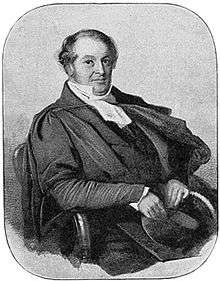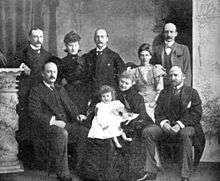Baden Powell (mathematician)
| Baden Powell | |
|---|---|
 | |
| Born | 22 August 1796 |
| Died |
11 June 1860 (aged 63) Kensington, London, England |
Baden Powell, MA, FRS, FRGS (22 August 1796 – 11 June 1860)[1] was an English mathematician and Church of England priest. He held the Savilian Chair of Geometry at the University of Oxford from 1827 to 1860. Powell was a prominent liberal theologian who put forward advanced ideas about evolution.
Powell married three times, and had fourteen children in total.
Family
Powell's first marriage on 21 July 1821 to Eliza Rivaz (died 13 March 1836) was childless.
His second marriage on 27 September 1837 to Charlotte Pope (died 14 October 1844) produced one son and three daughters:
- Charlotte Elizabeth Powell, (14 September 1838–20 October 1917)
- Baden Henry Powell, (23 August 1841–2 January 1901)
- Louisa Ann Powell, (18 March 1843–1 August 1896)
- Laetitia Mary Powell, (4 June 1844–2 September 1865)

His third marriage on 10 March 1846 (at St Luke's Church, Chelsea) to Henrietta Grace Smyth (3 September 1824–13 October 1914), a daughter of Admiral Smyth, produced seven sons and three daughters:
- Henry Warington Smyth Powell, (3 February 1847–24 April 1921), a naval officer, a Fellow of the Royal Geographical Society and a King's Councillor
- George Smyth Powell, (24 December 1847–20 November 1898), a politician and Conservative MP (1885 – 1898)
- Augustus Smyth Powell (1849–1863)
- Francis (Frank) Smyth Powell (29 July 1850– 25 December 1933),[2] an artist who exhibited at the Royal Academy of Arts
- Henrietta Smyth Powell (28 October 1851–9 March 1854)
- John Penrose Smyth Powell (21 December 1852–14 December 1855)
- Jessie Smyth Powell (25 November 1855–24 July 1856)
- Robert Stephenson Smyth Powell, (22 February 1857–8 January 1941), an army officer, writer and a founder of the Boy Scouts and Girl Guides.
- Agnes Smyth Powell, (16 December 1858–2 June 1945), a founder of the Girl Guides
- Baden Fletcher Smyth Powell, (22 May 1860–3 October 1937), an army officer, aviator and president of the Royal Aeronautical Society
Shortly after Powell's death in 1860, his wife renamed the remaining children of his third marriage 'Baden-Powell'; the name was eventually legally changed by Royal Licence on 30 April 1902.[3] Baden Henry Powell is often also referred to as Baden Henry Baden-Powell.[4]
Evolution
Powell was an outspoken advocate of the constant uniformity of the laws of the material world. His views were liberal, and he was sympathetic to evolutionary theory long before Charles Darwin had revealed his ideas. He argued that science should not be placed next to scripture or the two approaches would conflict, and in his own version of Francis Bacon's dictum, contended that the book of God's works was separate from the book of God's word, claiming that moral and physical phenomena were completely independent.[5]
His faith in the uniformity of nature (except man's mind) was set out in a theological argument; if God is a lawgiver, then a "miracle" would break the lawful edicts that had been issued at Creation. Therefore, a belief in miracles would be entirely atheistic.[6] Powell's most significant works defended, in succession, the uniformitarian geology set out by Charles Lyell and the evolutionary ideas in Vestiges of the Natural History of Creation published anonymously by Robert Chambers which applied uniform laws to the history of life in contrast to more respectable ideas such as catastrophism involving a series of divine creations.[5] "He insisted that no tortured interpretation of Genesis would ever suffice; we had to let go of the Days of Creation and base Christianity on the moral laws of the New Testament."[7]
The boldness of Powell and other theologians in dealing with science led Joseph Dalton Hooker to comment in a letter to Asa Gray dated 29 March 1857: "These parsons are so in the habit of dealing with the abstractions of doctrines as if there was no difficulty about them whatever, so confident, from the practice of having the talk all to themselves for an hour at least every week with no one to gainsay a syllable they utter, be it ever so loose or bad, that they gallop over the course when their field is Botany or Geology as if we were in the pews and they in the pulpit. Witness the self-confident style of Whewell and Baden Powell, Sedgwick and Buckland." William Whewell, Adam Sedgwick and William Buckland opposed evolutionary ideas.[8]
When the idea of natural selection was mooted by Darwin and Wallace in their 1858 papers to the Linnaean Society, both Powell and his brother-in-law[9] William Henry Flower thought that natural selection made creation rational.[10]
The 'Philosophy of Creation' has been treated in a masterly manner by the Rev. Baden Powell, in his 'Essays on the Unity of Worlds,' 1855. Nothing can be more striking than the manner in which he shows that the introduction of new species is "a regular, not a casual phenomenon," or, as Sir John Herschel expresses it, "a natural in contra-distinction to a miraculous process."[11]
Essays and Reviews
He was one of seven liberal theologians who produced a manifesto titled Essays and Reviews around February 1860, which amongst other things joined in the debate over On the Origin of Species. These Anglicans included Oxford professors, country clergymen, the headmaster of Rugby school and a layman. Their declaration that miracles were irrational stirred up unprecedented anger, drawing much of the fire away from Charles Darwin. Essays sold 22,000 copies in two years, more than the Origin sold in twenty years, and sparked five years of increasingly polarised debate with books and pamphlets furiously contesting the issues.[6]
Referring to "Mr Darwin's masterly volume" and restating his argument that belief in miracles is atheistic, Baden Powell wrote that the book "must soon bring about an entire revolution in opinion in favour of the grand principle of the self-evolving powers of nature.":
Just a similar scepticism has been evinced by nearly all the first physiologists of the day, who have joined in rejecting the development theories of Lamarck and the Vestiges; and while they have strenuously maintained successive creations, have denied strenuously maintained successive creations, have denied and denounced the alleged production of organic life by Messrs. Crosse and Weekes, and stoutly maintained the impossibility of spontaneious generation, on the alleged ground of contradiction to experience. Yet it is now acknowledged under the high sanction of the name of Owen (British Association Address 1858), that 'creation' is only another name for our ignorance of the mode of production; and it has been the unanswered and unanswerable argument of another reasoner that new species must have originated either out of their inorganic elements, or out of previously organized forms; either development or spontaneous generation must be true: while a work has now appeared by a naturalist of the most acknowledged authority, Mr. Darwin's masterly volume on The Origin of Species by the law of 'natural selection' – which now substantiates on undeniable grounds the very principle so long denounced by the first naturalist – the origination of new species by natural causes: a work which must soon bring about an entire revolution of opinion in favour of the grand principle of the self-evolving powers of nature.[12]
He would have been on the platform at the British Association for the Advancement of Science 1860 Oxford evolution debate that was a highlight of the reaction to Darwin's theory. Huxley's antagonist Wilberforce was also the foremost critic of Essays and Reviews. Powell died of a heart attack a fortnight before the meeting.[6] He is buried in Kensal Green Cemetery, London.
Works
- History of Natural Philosophy from the Earliest Periods to the Present Time Published by Longman, Brown, Green, and Longmans, 1837, 396 pages
- The Connexion of Natural and Divine Truth Or the Study of the Inductive Philosophy Considered as Subservient to Theology: Or, The Study of the Inductive Philosophy, Considered as Subservient to Theology, Published by J.W. Parker, 1838, 313 pages
- A General and Elementary View of the Undulatory Theory, as Applied to the Dispersion of Light, and Some Other Subjects: Including the Substance of Several Papers, Printed in the Philosophical Transactions, and Other Journals, Published by J.W. Parker, 1841, 131 pages
- Lectures on Polarized Light: Together with a Lecture on the Microscope, Delivered Before the Pharmaceutical Society of Great Britain, and at the Medical School of the London Hospital, co-authored with Jonathan Pereira, Published by Longman, Brown, Green, and Longmans, 1854, 311 pages
- The Order of Nature: Considered in Reference to the Claims of Revelation : a Third Series of Essays, Published by Longman, Brown, Green, Longmans, & Roberts, 1859, 495 pages
Notable students
Lewis Carroll attended the lectures on pure geometry by Rev. Baden Powell.[13]
Notes
- ↑ GRO Register of Deaths: JUN 1860 1a 38 KENSINGTON - Baden Powell, age unknown
- ↑ B-P's diary transcribed by Colin Walker
- ↑ Charles Mosley, editor, Burke's Peerage and Baronetage, 106th edition, 2 volumes (Crans, Switzerland: Burke's Peerage (Genealogical Books) Ltd, 1999), volume 1, page 159.
- ↑ Books of Baden Henry Powell in The Library of Congress
- 1 2 Robert M. Young (1985). "The impact of Darwin on conventional thought". Darwin's Metaphor: Nature's Place in Victorian Culture. Archived from the original on 30 September 2007. Retrieved 2007-08-29.
- 1 2 3 Desmond & Moore 1991, p. 500
- ↑ Desmond, Adrian 1982. Archetypes and ancestors. Muller, London. p45
- ↑ Desmond & Moore 1991, p. 412
Huxley, Leonard 1918. Life and letters of Sir Joseph Dalton Hooker OM GCSI. London, Murray. pp. 477–478 - ↑ Flower married Georgiana Rosetta Smyth, younger sister of Henrietta Grace Smyth, on 15 April 1858.
- ↑ Desmond, Adrian 1982. Archetypes and ancestors. Muller, London. p51 et seq 'The Christian commitment'.
- ↑ Darwin 1861, p. xviii.
- ↑ "The 1860 publication: "Essays and Reviews" by (Church of England theologians) Temple, Williams, Powell, Wilson, Goodwin, Pattison and Jowett". Archived from the original on 30 August 2007. Retrieved 2007-08-29.
- ↑ The Lewis Carroll Society of North America, "A bouquet for the Gardener" (2011), pag. 194
References
- Darwin, Charles (1861). "On the Origin of Species by Means of Natural Selection, or the Preservation of Favoured Races in the Struggle for Life" (3rd ed.). London: John Murray.
- Desmond, Adrian; Moore, James (1991). Darwin. London: Michael Joseph, Penguin Group. ISBN 0-7181-3430-3.
Further reading
* Corsi, Pietro (1988). Science and Religion: Baden Powell and the Anglican Debate, 1800-1860, Cambridge University Press ISBN 0-521-24245-2, 346 pages
External links
- Baden Powell at Find a Grave
- Works by Baden Powell at Project Gutenberg
- Works by or about Baden Powell at Internet Archive
- Collection of obituary notices
- "Powell, the Rev. Baden (PWL833B)". A Cambridge Alumni Database. University of Cambridge.